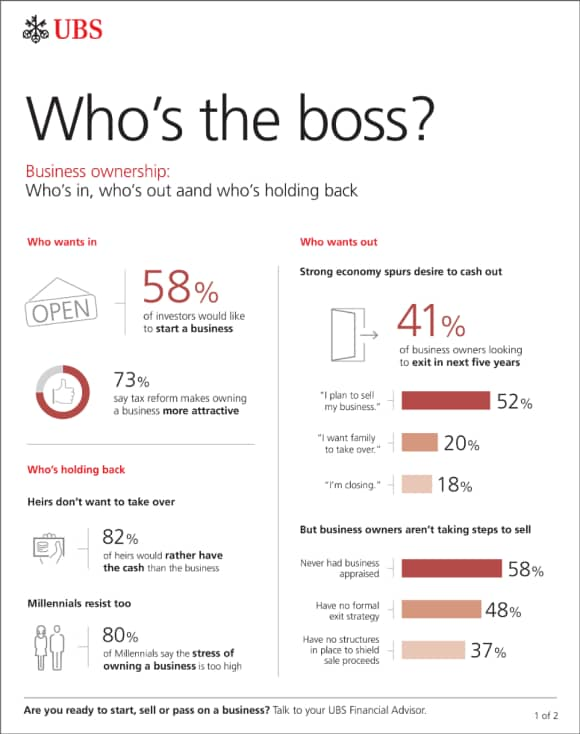Who’s the boss?
Business ownership: Whoʼs in, whoʼs out and whoʼs holding back
08 Feb 2018

From the runaway popularity of television’s Shark Tank to the iconic status of Steve Jobs and Jeff Bezos, Americans are fascinated by entrepreneurialism. Today, nearly 60% of wealthy investors would consider starting a business of their own.
At the same time, more than 40% of current business owners are preparing to exit. In this issue of UBS Investor Watch, “Who’s the boss?”we examine these two trends. Together, they will undoubtedly impact the face of business—and the wealth it creates—for years to come.
The recent tax and regulatory reform and continued economic expansion have increased the allure of owning a business. Many wealthy investors would consider starting a business now or in the near future.
On the other hand, the economic environment is spurring some business owners to cash out. More than 40% plan to leave their business in the next five years. Of those, half plan to sell.
It remains to be seen, however, who will fill the void. While Millennials are the most inclined to start a business, they are conflicted about following through. More than any other generation, they believe starting a business is far too risky and inflicts high levels of stress.
In addition, Millennials make reluctant successors. Four in five current business owners say their children would rather inherit money from the sale of a business than the business itself.
As engines of commerce, employment and wealth creation, business owners play a critical role in the economy. In a changing landscape, some investors will take on that role—and some will simply watch it on Shark Tank.
Among wealthy investors, being an entrepreneur is increasingly popular...
Among wealthy investors, being an entrepreneur is increasingly popular...

When wealthy investors were growing up, few considered owning a business to be the most respected career path. Over time, however, entrepreneurship has grown in stature and popularity.
Half of wealthy investors believe owning a business is one of the most prestigious careers to pursue, now and in the future. Most also believe that investors just starting a career would rank entrepreneur at the top of the list.
To be a business owner takes courage, passion, a tolerance for ambiguity, creativity and a deep belief in yourself to be successful.
Entrepreneurs are growing in prestige
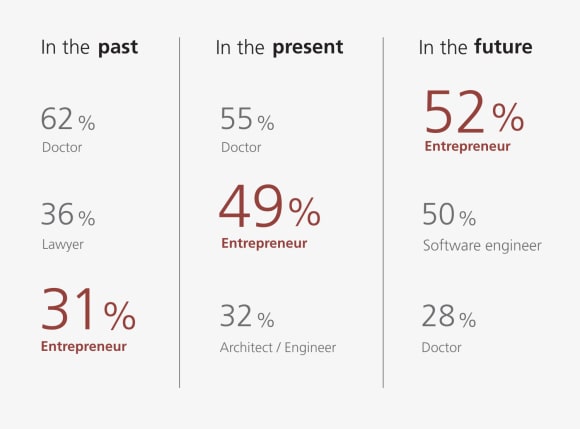
I have seen some friends who started businesses that have blossomed, and I wonder if that could have been me. They are happy and love what they do.
..and many investors believe now is the time to own a business
..and many investors believe now is the time to own a business
Bolstered by a favorable environment for business—and drawn by the prospect of being their own boss—58% of today’s wealthy investors would consider starting a business. Their outlook on the economy is the highest it’s been since the financial crisis (72% highly optimistic), while recent tax and regulatory reform have made the idea of owning a business even more attractive.
Now that the economy is picking up and consumer confidence is on the rise, I feel more secure in pursuing a business venture.
Conditions are ripe for business
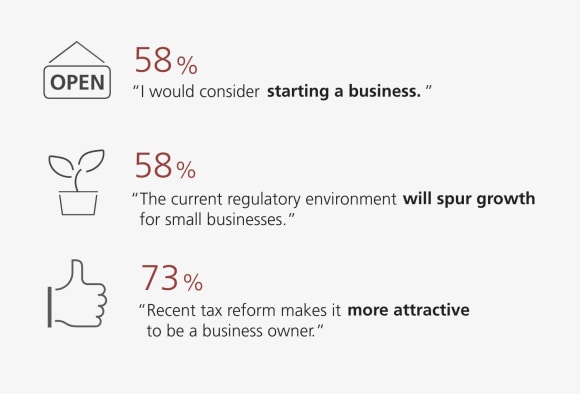
Now that the economy is picking up and consumer confidence is on the rise, I feel more secure in pursuing a business venture.
In a strong economy, some business owners see an opportunity to cash out..
In a strong economy, some business owners see an opportunity to cash out..

Forty-one percent of business owners expect to exit their business in the next five years. Many are at or approaching traditional retirement age and feel ready to start a new chapter. Other business owners believe current economic conditions will boost their chances of selling at a favorable price.
Among business owners who plan to exit, about half intend to sell, while 20% want to leave the business to family.
Timing is everything. Now is a good time to entertain offers.
Selling the business is the preferred exit strategy
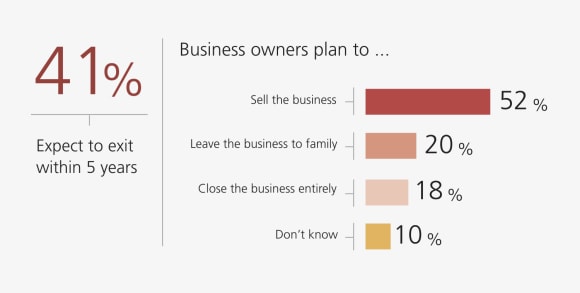
Money and lifestyle are key reasons for leaving

I don’t want to work forever, and what we’ve built will have value for others.
...but many have neglected key steps to prepare for a sale
...but many have neglected key steps to prepare for a sale
FoBusiness owners may be underestimating what’s required for a successful sale. In fact, 75% of owners planning to sell believe they could do so in a year or less.
However, 58% of business owners have never had their business appraised, and 48% have no formal exit strategy in place. Most expect a competitor to buy their firm, ahead of employees, large companies or private equity firms.
To prepare for selling the company, the balance sheet needs to be in good shape. The business needs to be showing profitability. I need to have a clear idea of what the business is worth, and the terms I’m willing to agree to.
Business owners look to competitors as buyers
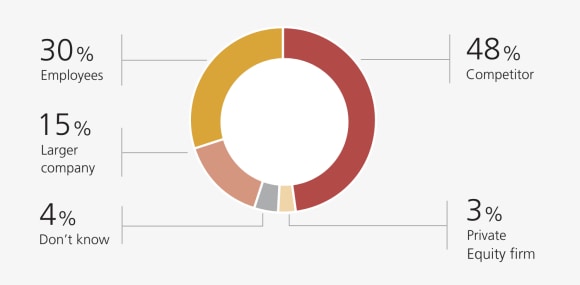
Many business owners are unprepared for a sale

I need an outside individual or firm to develop a fair value of the company plus outline logical steps to sell the business. Doing things the right way will maximize
the sale of the business and minimize tax liabilities.
Heirs are often reluctant to take over the family business…
Heirs are often reluctant to take over the family business…

While more than half of business owners’ adult children work for the business full- or part-time, few are interested in assuming ownership. Among business owners who plan to sell but considered keeping the business in the family, 89% cite a lack of interest from their potential heirs.
In addition, a full 82% of business owners say their children would rather inherit the assets from the sale of the business than the business itself.
Thanks, but no thanks

Why business owners won't pass the baton

None of our family members are interested in the business. It would be heartbreaking to see it fail if a family member took it over. We hope to be able
to just walk away and not have to worry
It would be easier to just leave my family cash as opposed to leaving them a business that they don’t know how to run.
…but when heirs do take over, parents worry about their legacy
…but when heirs do take over, parents worry about their legacy
After spending a lifetime building a successful enterprise, 62% of business owners worry about missing their role after retiring. However, most of their anxiety relates to how successors will carry on their legacy.
Among owners who are planning to give the business to family, top concerns include the future direction of the business, successors’ ability to manage the business and the potential for strain on family relationships.
Owners worry family ties will fray
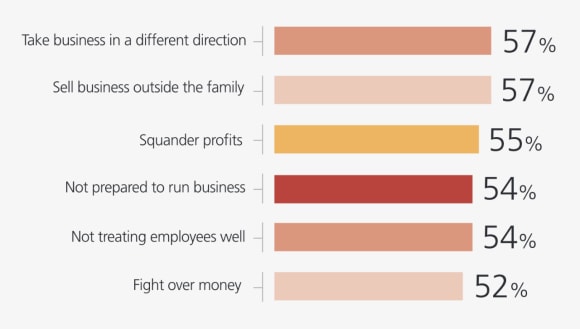
My children and nephew will be the new owners. I am worried about their inexperience and ability to work
together to run the business.
I am worried that I will lose a piece of my identity and that I will no longer have any say in the business.
Millennials are strongly attracted to the idea of starting a business…
Millennials are strongly attracted to the idea of starting a business…

Most Millennials are intrigued by the notion of starting a business. A full 72% would consider it, enticed by the independence, the opportunity to pursue a passion and the potential for financial gain. Most Millennials are intrigued by the notion of starting a business. A full 72% would consider it, enticed by the independence, the opportunity to pursue a passion and the potential for financial gain.
Starting a business appeals to Millennials
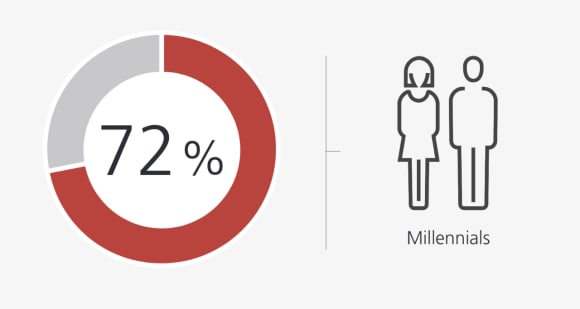
Top reasons Millennials would start a business

I would like being my own boss and being directly responsible for the success of my business.
The most attractive aspect of owning my own business would be the ability to pursue my dreams as far as they’ll go.
...but fear of failure keeps them on the sidelines
...but fear of failure keeps them on the sidelines
Though many Millennials aspire to own a business, few seem inclined to make their dreams a reality. More than any other generation, Millennials view starting a business as too risky and too stressful. Nine in 10 believe pursuing a professional career is easier.
Millennials’ restraint is in stark contrast to the approach their parents took. Current business owners, most of whom are Baby Boomers, founded their businesses when they were just 25 years old, on average.
Millennials see excessive risk in owning a business
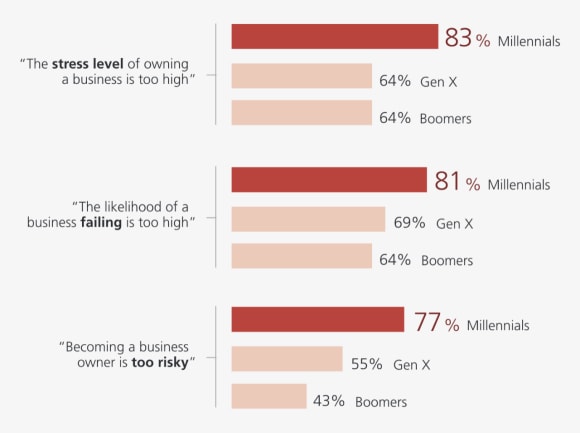
Start-ups can give you a feeling of insecurity. With a large corporation, there is really no worry because you know that the company will keep going, regardless of whether you make a mistake or not.
Owning a business is very risky. You usually provide the capital, and you take on legal and other risks. As an employee, the employer takes that on for you.
About the survey
About the survey
UBS Wealth Management Americas surveys U.S. investors on a quarterly basis to keep a pulse on their needs, goals and concerns. After identifying several emerging trends in the survey data, UBS decided in 2012 to create the UBS Investor Watch to track, analyze and report the sentiment of affluent and high net worth investors.
UBS Investor Watch surveys cover a variety of topics, including:
- Overall financial sentiment
- Economic outlook and concerns
- Personal goals and concerns
- Key topics, like aging and retirement
For this twenty-second edition of UBS Investor Watch, we surveyed 2,245 affluent and high net worth investors (with at least $1 million in investable assets) from December 13 – January 2, 2018, including 264 with at least $5 million. 1,085 survey respondents are business owners (770 current/315 former) with at least one employee and $250k in annual revenue. With 90 survey respondents, we conducted qualitative follow-up interviews.
